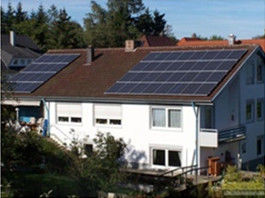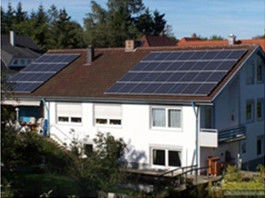Now countries in the world have taken a lot of encouragement policy for the solar industry, and implemented various government plans for a long time, such as “millions of green residential building plan” in Britain, "million of solar roofs plan" in American, "millions of roof plan" in Europe, the "sunshine roof plan" in Japan and so on. Countries have formulated some policies and regulations in different degree, and establish various target program of each stage.
Feature
1. It can enhance the aesthetics of the building. Adopting "roof tile" instead of the part of the building tiles on the original roof, it can not only further reduce construction cost, but also achieve the effect of waterproof and sunshade. It is integrated with the architecture and has unique and beautiful appearance. On the other hand, it also brings some tourism value.
2. Once photovoltaic power system is complete, it will greatly reduce the energy consumption of the building. According to the estimates, under the standard sunshine conditions (1000W/m2), installing solar power systems can get 130-180 watts of electricity per square. So buildings can use electricity generated by battery components for lighting, and after excess electricity can also pull it for the Internet, so as to get a little profit.
3. Photovoltaic roof is less pollution to environment, and can reduce emissions of CO2 largely. Experts predict that if the cumulative amount of solar cells reached 600MW, about 590,000 t carbon dioxide emissions will reduce annually. And according to the State Ministry statistics, per kilowatt hour requires about 350 grams of coal. It is generally known that coal is the main source of greenhouse gases, and solar photovoltaic power generation system will be able to reduce coal combustion.
Parameter
BIPV building integrated photovoltaic system based on PV micro inverter system architecture main including:
1. Solar cell panel. This is the source of energy collection and photoelectric conversion. Generally we place the solar panel components on the roof or well-light wall, open areas.
2. Solar energy micro inverter module. The solar panels collect electric energy for efficient power conversion through modern power electronic technology. It converts the fluctuant and transformational low voltage direct current (dc) which is the original voltage current into stable voltage DC. Its key technologies include: high efficiency power conversion, low harmonic technology, grid connection technology, grid connection fault detection technology and so on.
3. Smart electric meter. It can meet the needs of the new type smart power grid, and make various power information, micro-inverter operating state information and other information recorded, stored and transferred.
4. Combined to the grid. It will combine the solar clean energy to the grid and transferred to the load side of the power grid.
5. Energy management, information processing unit. It will deal with various information systematically which gained by smart electric meter.
6. Localization monitoring system. It can directly examine all kinds of power information, working status information and fault information and so on in the local client.
7. Remote monitoring unit. It can realize remote transmission. Transfer the system power information, the micro inverter working status information and the fault information to the customer's remote monitory point. So information can cover local area network (LAN), or the Internet. Its transmission mode can be divided into wire and wireless.


 Your message must be between 20-3,000 characters!
Your message must be between 20-3,000 characters! Please check your E-mail!
Please check your E-mail!  Your message must be between 20-3,000 characters!
Your message must be between 20-3,000 characters! Please check your E-mail!
Please check your E-mail! 



